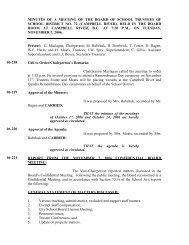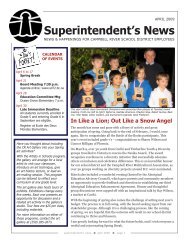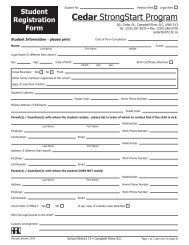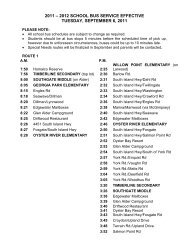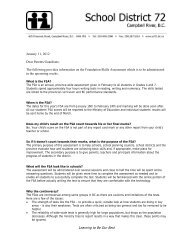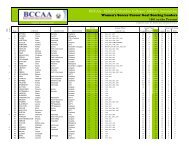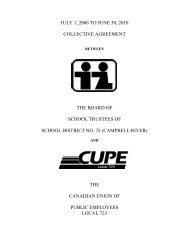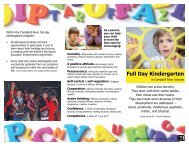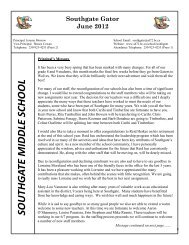Aboriginal Education Handbook - Campbell River School District
Aboriginal Education Handbook - Campbell River School District
Aboriginal Education Handbook - Campbell River School District
Create successful ePaper yourself
Turn your PDF publications into a flip-book with our unique Google optimized e-Paper software.
SD#<br />
72 <strong>Campbell</strong> <strong>River</strong><br />
<strong>Aboriginal</strong> <strong>Education</strong><br />
Hand<br />
dbook<br />
Greg Johnson -<strong>District</strong> Principal off <strong>Aboriginal</strong> <strong>Education</strong>
<strong>School</strong> <strong>District</strong> #72: <strong>Aboriginal</strong> <strong>Education</strong> <strong>Handbook</strong> 1<br />
Introduction<br />
<strong>Aboriginal</strong> <strong>Education</strong> <strong>Handbook</strong><br />
S.D. #72 – <strong>Campbell</strong> <strong>River</strong><br />
This handbook is for <strong>School</strong> <strong>District</strong> #72 employees and the Board of <strong>School</strong> Trustees.<br />
Its purpose is to provide information about the <strong>Campbell</strong> <strong>River</strong> <strong>Aboriginal</strong> <strong>Education</strong><br />
Enhancement Agreement, the <strong>Aboriginal</strong> <strong>Education</strong> Department programs and<br />
personnel, and how as a district we can work together to ensure the success of all<br />
<strong>Aboriginal</strong> learners.<br />
Contents:<br />
Pg. 1<br />
Pg 3<br />
Pg. 5<br />
Pg. 6<br />
Pg. 7<br />
Pg. 8<br />
The third <strong>Campbell</strong> <strong>River</strong> <strong>Aboriginal</strong> <strong>Education</strong> Enhancement<br />
Agreement (2009-2014)<br />
Targeted Funding<br />
<strong>Aboriginal</strong> <strong>Education</strong> Programs<br />
• Liq w ala/K w ak w la Language and Culture<br />
English Skills Development (ESD)<br />
<strong>Aboriginal</strong> <strong>Education</strong> Department Personnel<br />
• <strong>District</strong> Principal of <strong>Aboriginal</strong> <strong>Education</strong><br />
<strong>Aboriginal</strong> Support Teachers<br />
• <strong>Aboriginal</strong> Support Workers<br />
• <strong>Aboriginal</strong> <strong>Education</strong> Assistants<br />
Liq w ala/K w ak w la Language Program Office at Robron Centre<br />
Contacts<br />
Appendix A: <strong>Aboriginal</strong> <strong>Education</strong> Advisory Council<br />
The Third <strong>Campbell</strong> <strong>River</strong> <strong>Aboriginal</strong> <strong>Education</strong> Enhancement Agreement 2009-2014<br />
What is an Enhancement Agreement (EA)<br />
An Enhancement Agreement (EA) is a working agreement between a school<br />
district, all local <strong>Aboriginal</strong> communities, and the Ministry of <strong>Education</strong>. EAs are<br />
designed to enhance the educational achievement of <strong>Aboriginal</strong> students. The EA<br />
establishes a collaborative partnership between <strong>Aboriginal</strong> communities and school<br />
districts and involves shared decision-making and specific goal setting to meet the<br />
educational needs of <strong>Aboriginal</strong> students.<br />
Enhancement Agreements highlight the importance of academic performance<br />
and more importantly, stress the integral nature of <strong>Aboriginal</strong> traditional culture and<br />
languages to <strong>Aboriginal</strong> student development and success. Fundamental to EAs is<br />
the requirement that school districts provide strong programs on the culture of local<br />
<strong>Aboriginal</strong> peoples on whose traditional territories the districts are located.
<strong>School</strong> <strong>District</strong> #72: <strong>Aboriginal</strong> <strong>Education</strong> <strong>Handbook</strong> 2<br />
Enhancement Agreements . . . .<br />
• are intended to continually improve the quality of education achieved by all<br />
<strong>Aboriginal</strong> students;<br />
• support strong cooperative, collaborative relationships between <strong>Aboriginal</strong><br />
communities and school districts;<br />
• provide <strong>Aboriginal</strong> communities and districts greater autonomy to find<br />
solutions that work for <strong>Aboriginal</strong> students, the schools and the communities;<br />
and<br />
• require a high level of respect and trust to function.<br />
Background<br />
Enhancement Agreements resulted from the recognition by the Ministry of<br />
<strong>Education</strong> that British Columbia schools have not been successful in ensuring that<br />
<strong>Aboriginal</strong> students receive a quality education, one that allows these students to<br />
succeed in the larger provincial economy while maintaining ties to their culture.<br />
Growing recognition of this problem led to the signing of a Memorandum of<br />
Understanding in 1999:<br />
"We the undersigned, acknowledge that <strong>Aboriginal</strong> learners are not experiencing<br />
school success in British Columbia. We state our intention to work together within the<br />
mandates of our respective organizations to improve school success for <strong>Aboriginal</strong><br />
learners in British Columbia."<br />
Memorandum signatories included:<br />
o the Chiefs Action Committee,<br />
o the provincial Minister of <strong>Education</strong>,<br />
o the federal Minister of Indian and Northern Affairs, and<br />
o the President of the BC Teachers Federation.<br />
The third <strong>Campbell</strong> <strong>River</strong> <strong>Aboriginal</strong> <strong>Education</strong> Enhancement Agreement (July 1,<br />
2009 – June 30, 2014) is an agreement signed by the <strong>School</strong> <strong>District</strong>; the <strong>Aboriginal</strong><br />
<strong>Education</strong> Advisory Council and the Ministry of <strong>Education</strong>. It recognizes our<br />
collective responsibility for ensuring the success of all <strong>Aboriginal</strong> learners. As such,<br />
we are tasked with providing a continuum of substantive learning experiences<br />
and/or support services throughout the school year for the benefit of all<br />
<strong>Aboriginal</strong> learners in the <strong>Campbell</strong> <strong>River</strong> <strong>School</strong> <strong>District</strong>. The goals of the<br />
Enhancement Agreement and <strong>Aboriginal</strong> student success are measured and<br />
reported on annually at a school and district level.<br />
The four goals of the third 2009-2014 <strong>Campbell</strong> <strong>River</strong> <strong>Aboriginal</strong> <strong>Education</strong><br />
Enhancement Agreement are as follows:<br />
• Year by year improvement in literacy and numeracy achievement by all<br />
<strong>Aboriginal</strong> students at the Elementary, Middle & Secondary <strong>School</strong> Levels (K – 12).
<strong>School</strong> <strong>District</strong> #72: <strong>Aboriginal</strong> <strong>Education</strong> <strong>Handbook</strong> 3<br />
• Year by year improvement in the transition rates of all aboriginal students at every<br />
grade level.<br />
• To increase the number of <strong>Aboriginal</strong> students who graduate with a Dogwood<br />
certificate. All <strong>Aboriginal</strong> students will be well prepared and knowledgeable about<br />
how to achieve their career and life goals.<br />
• To increase all <strong>Aboriginal</strong> students’ sense of pride and ensure they have<br />
opportunities to participate in and learn about their heritage and culture.<br />
Targeted Funding<br />
In order to provide academic and cultural programs to achieve the goals of the<br />
Enhancement Agreements the Ministry of <strong>Education</strong> provides targeted funds for<br />
aboriginal learners. Students qualifying for <strong>Aboriginal</strong> <strong>Education</strong> funding are funded<br />
at $1160 per full-time equivalent. The delivery and outcomes of <strong>Aboriginal</strong> programs<br />
and services must be measured and documented.<br />
Funded <strong>Aboriginal</strong> <strong>Education</strong> programs must be additional to any other programs<br />
and services to which an <strong>Aboriginal</strong> student is eligible, including provincial base<br />
funding, ESL/D and Special <strong>Education</strong>.<br />
Targeted <strong>Aboriginal</strong> <strong>Education</strong> funding must not be used to replace other funded<br />
programs such as Special <strong>Education</strong> or ESL. Targeted <strong>Aboriginal</strong> <strong>Education</strong> funding<br />
must not be used for the delivery of BC First Nations Studies 12 or other basic<br />
classroom instruction.<br />
<strong>Aboriginal</strong> <strong>Education</strong> Programs<br />
Liq w ala/K w ak w ala Language and Culture<br />
A very important purpose of our <strong>Education</strong>al Agreement is to honour and support<br />
the histories, cultures and languages of the First Nations whose traditional territories<br />
are served by <strong>School</strong> <strong>District</strong> No. 72. The local First Nations language, ~<br />
Liq w ala/K w ak w ala has been taught in <strong>Campbell</strong> <strong>River</strong> schools for approximately<br />
twenty-five years. The <strong>School</strong> <strong>District</strong> has been very fortunate to have had such<br />
knowledgeable and skilled speakers of the language work with our students. The<br />
Ministry approved curriculum for this course has been developed within the<br />
department. Over the years, the language program has flourished.<br />
Liq w ala/K w ak w ala is now offered at many of our elementary schools as well as at<br />
Ecole Phoenix Middle <strong>School</strong> and Carihi Secondary. Liq w ala/K w ak w ala is recognized<br />
by the University of Victoria as fulfilling the entrance requirements for a second<br />
language. It is our hope that after taking Liq w ala/K w ak w ala in school, students will<br />
have a greater awareness of the language and will go on to learn more of the<br />
language from speakers in their communities. Salishan, the language of one of our<br />
local First Nations is taught at Georgia Park Elementary and Cortes Island school.
<strong>School</strong> <strong>District</strong> #72: <strong>Aboriginal</strong> <strong>Education</strong> <strong>Handbook</strong> 4<br />
English Skills Development (ESD)<br />
English Skills Development or English as a Second Dialect (ESD) is a program offered<br />
at various schools throughout SD72, <strong>Campbell</strong> <strong>River</strong>. This program provides extended<br />
language development support to <strong>Aboriginal</strong> learners. This support may be<br />
necessary in order for these students to develop their individual potential.<br />
Students in the ESD program may come from a home where the English is<br />
significantly different from the English that is commonly used in schools. ESD students<br />
require additional support in order to function successfully in the school curriculum.<br />
ESD support services are oriented toward developing school language. English<br />
language proficiency should be considered in broad terms to take into account all<br />
of the differences between language used for social interaction and language<br />
used for purposes in all content areas.<br />
ESL Standards Document, B.C., Ministry of <strong>Education</strong> 2001, page 15.<br />
ESD Program Goals<br />
• To enrich the development of oral/aural language skills<br />
• To build self-confidence, self-esteem and cultural pride<br />
• To improve reading and writing skills using <strong>Aboriginal</strong> content when available<br />
• To provide an advocacy base for <strong>Aboriginal</strong> students within the schools.<br />
The following Principles of Learning are relevant to the philosophy of the ESD<br />
program:<br />
• Learning should be built on the educational and personal experiences of the<br />
student<br />
• Cultural identities and languages spoken at home should be honoured by<br />
instructional practices that recognize the knowledge and experiences<br />
students bring to school rather than attempt to replace them.<br />
• Learning a language means, among other things, learning to use the<br />
language to socialize, learn, query, imagine and wonder.<br />
• Students' cognitive and academic growth should continue while the<br />
language is developing.<br />
• Integrating language teaching within the teaching or curricular content<br />
simultaneously develops students' language, subject-area knowledge, and<br />
thinking skills.<br />
ESL Standards Document, BC Ministry of <strong>Education</strong> 2001, page 14<br />
<strong>Aboriginal</strong> <strong>Education</strong> Department Personnel<br />
<strong>District</strong> Principal of <strong>Aboriginal</strong> <strong>Education</strong><br />
The <strong>District</strong> Principal of <strong>Aboriginal</strong> <strong>Education</strong> is tasked with monitoring <strong>Aboriginal</strong><br />
student success and ensuring continued progress towards achieving the goals of<br />
the Enhancement Agreement. The <strong>District</strong> Principal supports district schools in this<br />
endeavor. The <strong>District</strong> Principal liaises with the <strong>Aboriginal</strong> <strong>Education</strong> Advisory<br />
Council, reports on the progress of the district’s <strong>Aboriginal</strong> students, ensures the<br />
allocated funds are well spent, and that programs and department personnel are<br />
meeting the needs of all learners, especially <strong>Aboriginal</strong> learners.
<strong>School</strong> <strong>District</strong> #72: <strong>Aboriginal</strong> <strong>Education</strong> <strong>Handbook</strong> 5<br />
<strong>Aboriginal</strong> Support Teachers<br />
Some of our elementary and secondary <strong>Aboriginal</strong> learners are supported by an<br />
<strong>Aboriginal</strong> Support teacher. The <strong>Aboriginal</strong> support teacher is an advocate for all<br />
aboriginal students. The support teacher’s number one priority is to support<br />
aboriginal students academically. The support teacher also works with aboriginal<br />
students and non-aboriginal students and staff at their school to develop individual<br />
<strong>Aboriginal</strong> students’ sense of identity and belonging through cultural support and<br />
celebrations. Finally the Support teacher informs and educates staff about student<br />
needs, historical contexts, the goals of the enhancement agreement and the<br />
districts commitment to fulfilling them.<br />
Roles and Responsibilities of the Support Teacher<br />
The Support teacher:<br />
• Has contact with all aboriginal students and monitors their progress and attendance.<br />
• Supports <strong>Aboriginal</strong> students needing the most support first.<br />
• Participates and assists staff in assessing “for” and “of” learning. (DART; DMA school<br />
wide assessments etc.)<br />
• Using the assessment data provides instructional support to identified individuals or<br />
groups of students in consultation with the classroom and Learning Assistance<br />
teachers.<br />
• Attends <strong>School</strong> Based Team meetings where <strong>Aboriginal</strong> students are being discussed<br />
and works with department, school and student service staff in fulfilling any plans.<br />
• Promotes the Enhancement Agreement and the district’s commitment to fulfilling it.<br />
• Ensure staff knows who the aboriginal students in their class are.<br />
• Establishes a system of communication with students, teachers and administrators so<br />
that all groups know how to access the support teacher to receive help and to<br />
ensure student success.<br />
• Provides cultural experiences to students.<br />
<strong>Aboriginal</strong> Support Workers<br />
<strong>School</strong> <strong>District</strong> No. 72 has eight <strong>Aboriginal</strong> Support Workers who work within our<br />
schools. <strong>Aboriginal</strong> Support Worker roles and responsibilities are described in the<br />
Criteria for Success below.<br />
BUILDING RELATIONSHIPS - with students; staffs; caregivers<br />
• Make regular contact with students through class check-ins; being present at break<br />
times and nutrition times; meeting and checking in with students; attending SBT and<br />
other meetings involving students.<br />
• Advocate for students and parents and support them during interactions with staff<br />
• Regular communication with caregivers via phone and home visits<br />
• Communicate regularly with administration and teaching staff regarding role and to<br />
support students.<br />
• Be dependable and accountable – follow through<br />
• Maintain confidentiality<br />
• Attend department and community events
<strong>School</strong> <strong>District</strong> #72: <strong>Aboriginal</strong> <strong>Education</strong> <strong>Handbook</strong> 6<br />
STUDENT SUPPORT<br />
Advocacy<br />
• Class placement and support for students to ensure their success<br />
Academic and Emotional Support<br />
• read reports – academic & attendance and follow-up<br />
• connect with community<br />
• support students with girl and boy groups; one-on-one time etc.<br />
• provide access to community supports and services for students and caregivers<br />
• meet with Administrators/teaching, district and department staff to support students<br />
• promote culture and cultural awareness<br />
• attend <strong>School</strong> functions and all meetings regarding <strong>Aboriginal</strong> students<br />
STAFF/SCHOOL/DISTRICT SUPPORT<br />
• be accountable and follow through<br />
• make regular contact with teachers & administrators to assist them and students<br />
• educate staff and school personnel to ensure a better understanding of children<br />
• be available<br />
• maintain confidential and accurate records of meetings, contacts and activities.<br />
PARENT/COMMUNITY SUPPORT<br />
• network with community services<br />
• support parents at appointments, meetings<br />
• establish relationships with school<br />
• ensure clear communication<br />
• help students and caregiver with forms etc.<br />
• attend school/community events<br />
<strong>Aboriginal</strong> <strong>Education</strong> Assistants<br />
“The role of the <strong>Aboriginal</strong> <strong>Education</strong>al Assistant is to empower all <strong>Aboriginal</strong><br />
students through the creation of strong positive relationships in order that students<br />
reach their full academic, emotional, and physical potential.”<br />
<strong>Aboriginal</strong> <strong>Education</strong>al Assistants are assigned to a school to be a role model for<br />
aboriginal students and assist <strong>Aboriginal</strong> students in their academic and emotional<br />
growth. <strong>Aboriginal</strong> <strong>Education</strong> assistants can be used in a variety of ways but should<br />
be used to assist as many aboriginal students as possible within a school. <strong>Aboriginal</strong><br />
students with designated special needs and requiring assistance from an<br />
<strong>Education</strong>al Assistant because of this designation are supported through Student<br />
Services. <strong>Aboriginal</strong> <strong>Education</strong> Assistants are a member of a school’s educational<br />
team and are scheduled by a school’s L.A. teacher/<strong>Aboriginal</strong> Support teacher<br />
and/or principal. It is appropriate to include non-aboriginal students within a small<br />
group of <strong>Aboriginal</strong> students an <strong>Aboriginal</strong> <strong>Education</strong> Assistant is working with. It<br />
would also be appropriate for a classroom teacher to assign an <strong>Aboriginal</strong><br />
<strong>Education</strong> Assistant to work with non-aboriginal students if the classroom teacher<br />
was working with a small group of <strong>Aboriginal</strong> students. In both examples the<br />
<strong>Aboriginal</strong> <strong>Education</strong> Assistant is supporting the education of <strong>Aboriginal</strong> students.
<strong>School</strong> <strong>District</strong> #72: <strong>Aboriginal</strong> <strong>Education</strong> <strong>Handbook</strong><br />
7<br />
Liq w ala / K w ak w ala Language Program Office @ Robron Centre<br />
Curriculum materials developed by office staff to support Liq w ala/K w ak w ala<br />
language instruction and culture are created and available here. As<br />
well, the<br />
<strong>District</strong> Leveled readers, WhalesTales,<br />
, are available throughh the office. Teaching<br />
staff who need support in the delivery<br />
of lessons or in accessing a guest speaker to<br />
visit your class can call the<br />
Language<br />
office and<br />
we will be<br />
happy to support their<br />
needs.<br />
Contacts<br />
Karen Giesbrecht:<br />
Secretary<br />
Monday- Friday<br />
Liq w ala / K w ak w ala Language Program<br />
Office @ Robron Centre<br />
Ph. 923-4902 Loc. 2211<br />
Fax: 923-4903<br />
Greg<br />
Johnson: <strong>District</strong> Principal of <strong>Aboriginal</strong> <strong>Education</strong> and Alternatee Programs<br />
Monday- Friday<br />
Liq w ala / K w ak w ala Language Program<br />
Office @ Robron Centre<br />
Ph. 923-4902 Loc. 2216<br />
Fax: 923-4903
<strong>School</strong> <strong>District</strong> #72: <strong>Aboriginal</strong> <strong>Education</strong> <strong>Handbook</strong> 8<br />
Appendix A: <strong>Aboriginal</strong> <strong>Education</strong> Advisory Council (AEAC)<br />
The <strong>Aboriginal</strong> <strong>Education</strong> Advisory Council must be acknowledged for their<br />
continued dedication to the success of <strong>Aboriginal</strong> students in <strong>School</strong> <strong>District</strong> #72<br />
and the wisdom and leadership they provide as they work together with <strong>School</strong><br />
<strong>District</strong> #72 to ensure the Council’s vision of successful <strong>Aboriginal</strong> learners becomes<br />
reality.<br />
AEAC Vision of Successful <strong>Aboriginal</strong> Learners<br />
“Successful <strong>Aboriginal</strong> students will identify their heritage, language and culture<br />
with pride, confidence and knowledge… throughout their school careers and<br />
beyond. They have a family, community and school district that are supportive of<br />
education. They, their family and community, feel welcomed and at ease in the<br />
school setting. They apply themselves to the best of their ability and acquire selfadvocacy<br />
and life skills related to their personal learning style. They understand and<br />
value the importance of graduation in furthering their education. They are<br />
knowledgeable about their options, identify their passions and make choices<br />
relevant to their personal strengths. They are confident and have a positive selfimage.<br />
They are part of a safe environment and have a true sense of belonging.<br />
They realize that their uniqueness is valued, honoured and respected.”<br />
Members of the <strong>Aboriginal</strong> <strong>Education</strong> Advisory Council:<br />
• Averil Henderson – <strong>Campbell</strong> <strong>River</strong> First Nation<br />
• Alison Trenholm – Homalco First Nation<br />
• Lisa Anwar – Kwakiutl <strong>District</strong> Council<br />
• Eileen Haggard – Nuu-Chah-Nulth Tribal Council<br />
• Pamela Lewis _ Cape Mudge First Nation<br />
• Julie Hanuse – Klahoose First Nation<br />
• Shirley Smith – North Island Métis Nation<br />
The <strong>Aboriginal</strong> <strong>Education</strong> Advisory Council goals are to:<br />
• Continue to develop and enhance open and positive communication<br />
among all partners in <strong>Aboriginal</strong> <strong>Education</strong>.<br />
• Develop and use <strong>Aboriginal</strong> resources in schools and school curriculum and<br />
promote the instruction of Liqwala/Kwakwala and Coast Salish languages,<br />
and develop awareness of the Métis culture and Michif language.<br />
• Monitor the <strong>District</strong>’s progress in building success for <strong>Aboriginal</strong> student<br />
performance on local and provincial assessments.



